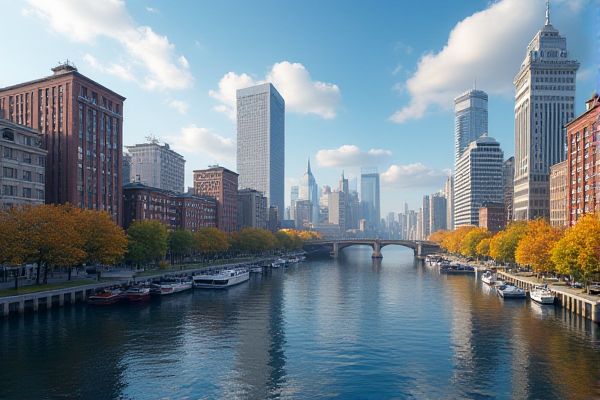
Cost of living in New Jersey: High property tax rates. Varied housing market prices. Grocery costs above national average. Utility expenses fluctuate seasonally. Average healthcare costs are high. Commuting costs can be significant. Prices for dining out vary regionally. Education costs higher in urban areas. Wide-ranging internet and cable fees. Entertainment options can be pricey.
High property tax rates.
New Jersey has the highest average property tax rate in the U.S., at 2.23% of a home's assessed value, with average property tax payments exceeding $9,800 annually. This significantly impacts the cost of living and real estate affordability in the state. For more details on this topic, you can visit the State Taxes Guide on AARP's website.
Varied housing market prices.
The New Jersey housing market is known for its high prices and significant regional variations, with the median home price currently at $494,900, reflecting a 16.1% increase over the past year. Areas like Fort Lee and Union City illustrate this diversity with median sale prices of $560,000 and $600,000, respectively. Contributing to the overall expense is the state’s elevated cost of living, where housing costs alone show stark contrasts—from Newark's median home value of $369,747 to Princeton's striking $1,189,440. In larger cities such as Jersey City, Montclair, and Princeton, median list prices can reach $699,950, $1,024,500, and $1,699,000, accordingly. Despite these variances, the consistent trend points toward substantial financial commitments for prospective homeowners looking to secure property within the Garden State. For more comprehensive insights into this dynamic, competitive market, explore the trends and analyses provided by Houzeo's blog on the New Jersey real estate market.
Grocery costs above national average.
New Jersey has experienced a significant increase in grocery prices, with a 6.8% rise over the last 12 months, exceeding the national average of 5.3%. This increase is attributed to factors such as supply chain issues, higher operating costs, and the state's high population density and incomes. For a detailed exploration of these rising costs, visit the article on New Jersey Highest Grocery Prices, which provides insight into the economic factors influencing this trend.
Utility expenses fluctuate seasonally.
Utility expenses in New Jersey fluctuate significantly due to seasonal demand, with peak usage during summer for air conditioning and winter for heating, straining the electrical grid and leading to higher operational costs passed on to consumers. Additionally, factors like extreme weather, holiday lighting, and the prevalence of electronic devices contribute to these seasonal spikes in electricity consumption. For further information on the complexities of these rising costs, you can visit Seabright Solar, which provides insights into why electric bills in New Jersey are so high.
Average healthcare costs are high.
Healthcare costs in New Jersey are notably high, with average monthly premiums for individuals around $500 and for families around $1,483. Additionally, costs for medical visits, hospital stays, and prescription medications are among the highest in the US, with an average ER visit costing $3,750 and hospital stays exceeding $3,175 per day. For more insights into these financial challenges, you can explore the details on Healthcare Costs In New Jersey. Understanding these expenses is crucial for residents as they navigate their healthcare options.
Commuting costs can be significant.
Commuting costs in New Jersey are significant, with a 15% fare increase for New Jersey Transit trains and buses set for July 1, 2024, alongside existing toll increases on the New Jersey Turnpike and Garden State Parkway. These rising expenses can severely impact individuals living paycheck-to-paycheck and relying heavily on public transportation. The implications are vast, highlighting the urgent need for solutions to [the increasing cost of commuting](https://themontclarion.org/feature/pricing-out-the-public-the-increasing-cost-of-commuting-in-new-jersey/) in the state to ensure accessibility and affordability for all residents.
Prices for dining out vary regionally.
In New Jersey, prices for dining out have significantly increased, particularly on the Jersey Shore, where a typical dinner can now cost around $200. Main courses often range from $40 to $60 and appetizers from $20 to $30, reflecting a higher cost of living compared to other areas like NYC's Little Italy. For more insights into the current dining landscape, the article on Hungry Onion provides a detailed discussion on what is considered expensive dining in NJ today.
Education costs higher in urban areas.
In New Jersey, education costs are notably higher in urban areas, particularly within the 31 very poor urban "Abbott" districts, which spend $10,539 per weighted pupil. Additionally, other high-needs districts surpass the state average due to elevated concentrations of poverty and educational demands. For more information on this, you can visit the Ed Law Center, which provides a comprehensive analysis of education funding across different regions, emphasizing the economic and social disparities that elevate educational expenses in these urban districts.
Wide-ranging internet and cable fees.
New Jersey residents experience a notable financial burden as they pay approximately $144 more per year compared to the national average for internet and cable bills, reflecting the state's higher costs for these services. This disparity in expenses highlights how the Garden State's cost of living can significantly impact household budgets. To learn more about how these expenses stack up against the rest of the USA, visit the detailed analysis on the 973 ESPN website, which provides valuable insights and a comprehensive comparison.
Entertainment options can be pricey.
Entertainment options in New Jersey can be quite pricey, with various costs contributing to the overall expenditure. A mid-range restaurant meal typically costs $35.55, while the fare for a 1-hour taxi ride can be around $25.00. Additionally, catching a movie can set you back by $19.44, adding to an overall entertainment cost of about $79.99 per month. These figures reflect the broader cost of living in New Jersey, and for those interested in delving deeper into this topic, visiting the Moving Waldo website could provide more insights.
